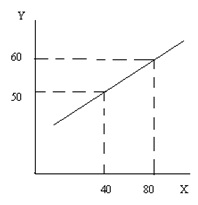Problem 1. Joe made an 80 on his first chemistry midterm and a 78 on his second chemistry midterm. He knows he must have an average of 84 on the two midterms and his final to earn an AB in the course. All three exams are equally weighted and all are graded on a 100 point scale. What score must he earn on his final in order to have an average of 84 on all three exams? Show your work for full credit.
Problem 2. Ellen is given the following information and she is asked to write an equation expressing this information. She is told that when the price of doughnuts is $0.50, the quantity of doughnuts demanded is 1000. She also knows that when the price of doughnuts is $1.00, the quantity of doughnuts demanded is 750. Finally she is told to assume that the relationship between the price of doughnuts (P) and the quantity of doughnuts demanded (Q) is linear. Write an equation expressing the relationship between Q and P. Show your work for full credit.
Problem 3. Find the solutions (x, y) for each set of equations below. Show your work for full credit.
a. x = 10 - 2y and y = 5 + 4x
b. x = 1/2 - (1/4)y and y = 12 + x
c. y = 2x + 100 and y = 75 - 3x
Problem 4. Compute the following: for full credit, show your work. (If necessary, all answers should be rounded to two places past the decimal.)
a. (1/2)(x)2(y)3 = _______ when x = 3 and y = 2
b. 38% of 250 = _______
c. For this one, your answer should be written as a decimal and round to the nearest hundredth.
(2/3) + (4/5) + (7/8) = ______________________
5. Use the figure below of a linear relationship between X and Y to answer this question. Note that the figure is NOT drawn to scale. Show your work for full credit and provide a verbal as well as mathematical proof for your answer.

a. Does the point (X, Y) = (100, 150) sit on this line, above this line, or below this line?
b. Does the point (X, Y) = (-100, -60) sit on this line, above this line, or below this line?
c. Does the point (X, Y) = (120, 70) sit on this line, above this line, or below this line?